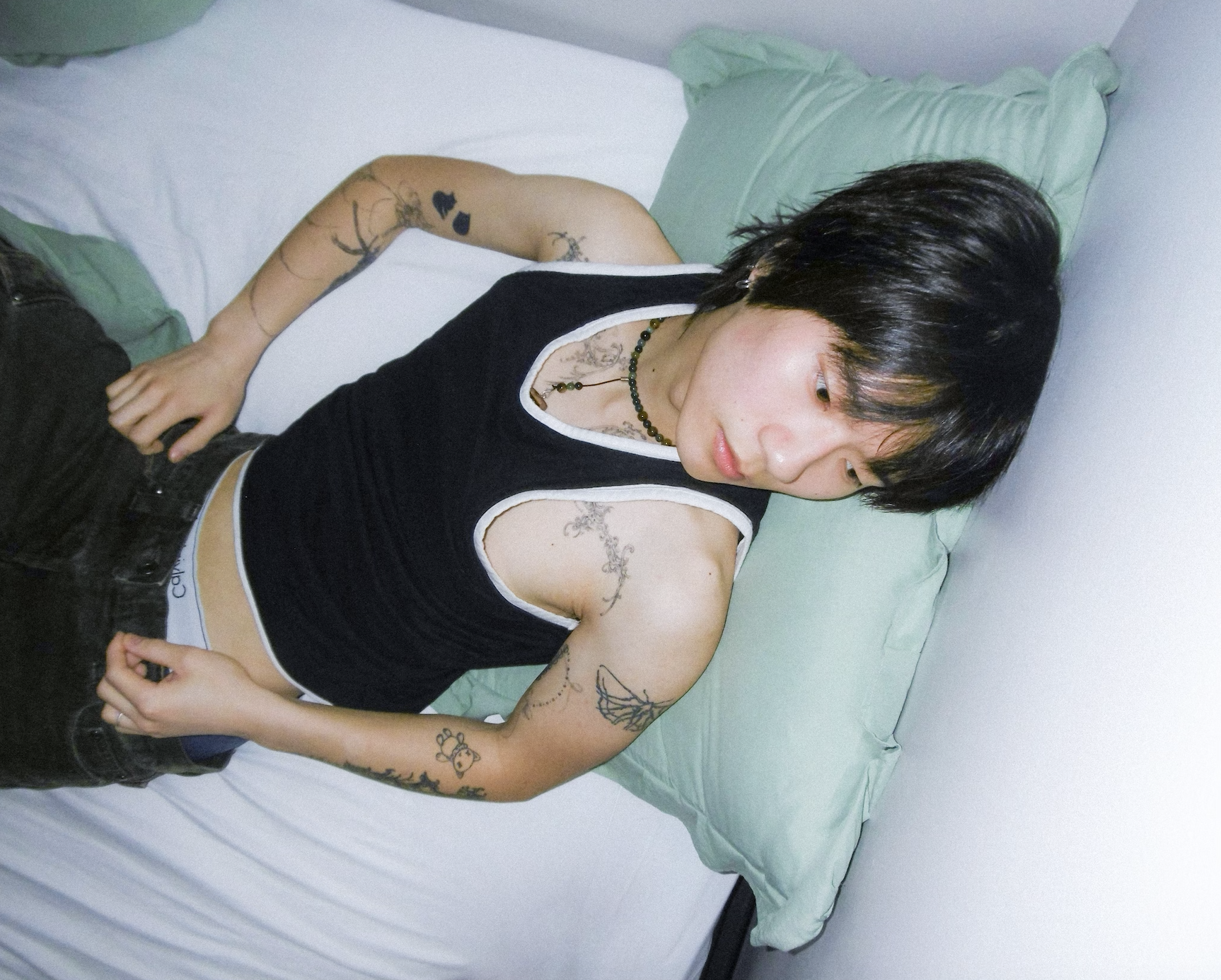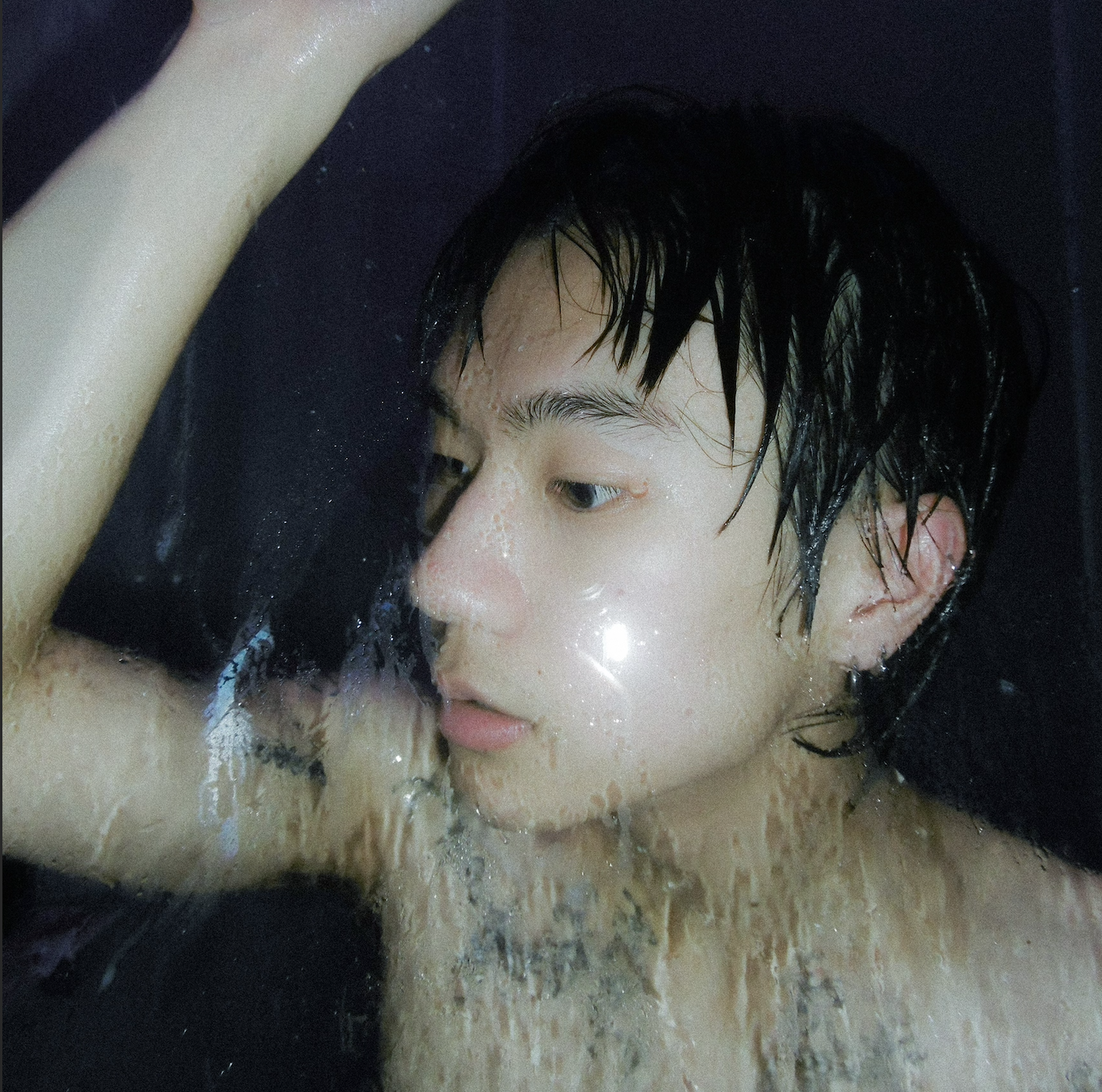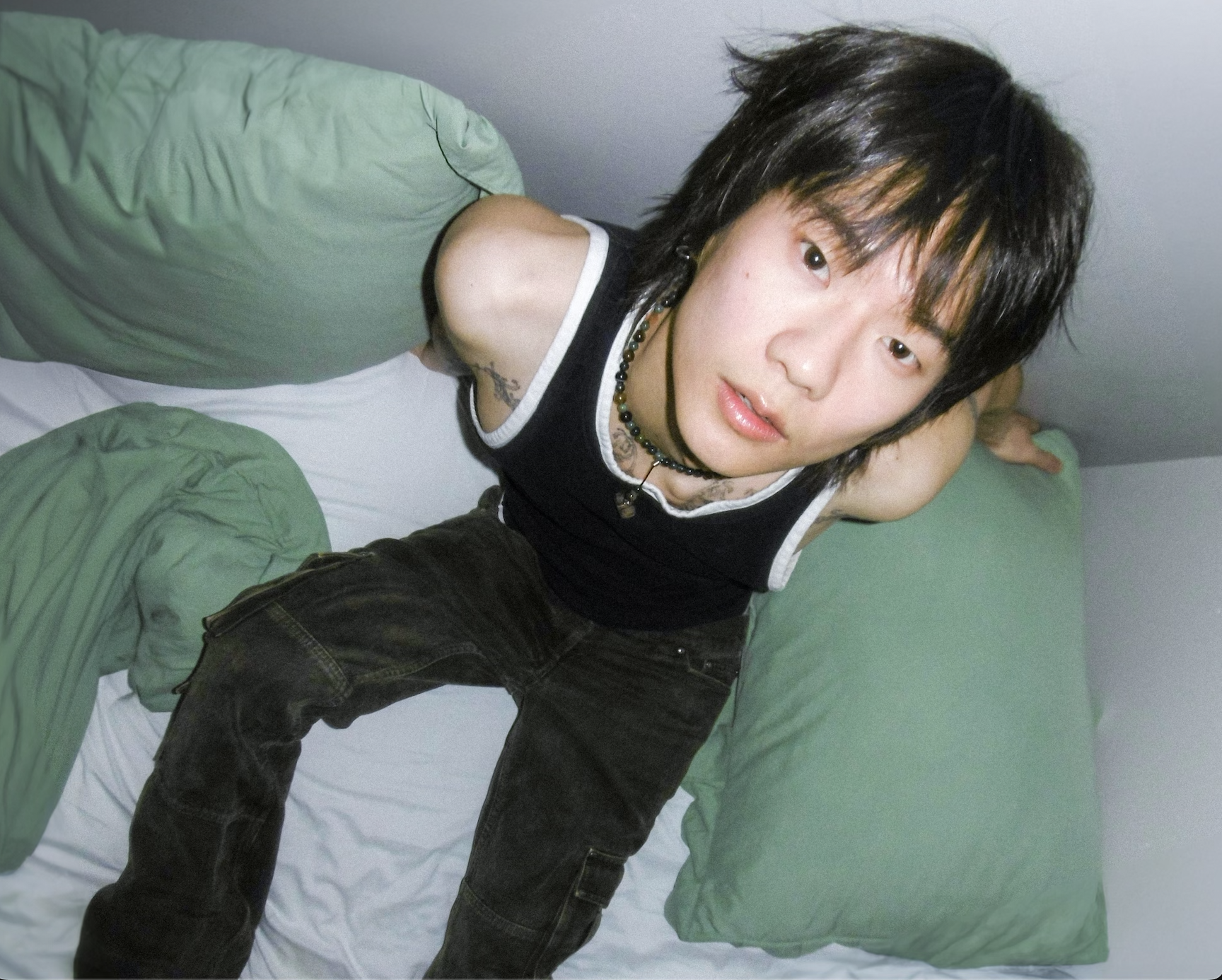Being An Outsider Didn’t Silence hevel. It Empowered Them.
Growing up, the Korean musician was taught to never express their emotions. For their forthcoming album, hevel does the exact opposite.
“I’m still in the process of accepting that it’s okay that I’m not the same. I’m embracing it,” hevel says in their first major interview.
When I first met hevel, a twenty-three year old Korean musician now based in Michigan, we were immediately sidetracked by a shared hobby of collecting CDs.
“Vinyls are too fucking expensive,” they grouched to me one evening as we spent twenty minutes comparing our collections.
So they spend their days at used music stores, crate digging for an album that they’ve never heard of. Maybe the cover art appeals to them; perhaps it’s an album they read about online but it’s enticing enough to add to their collection, but either way, the CD comes home with them to a large collection of music.
hevel and I share a lot in common: We both overshare in conversation (within twenty minutes of meeting, we begin bonding over similar life trajectories); we both have a really dark, sick sense of humor. We both curse too much (the words “fuck” and “shit” line nearly every other sentence in this interview). More saccharine, depending on how you look at it, we’re also both audiophiles, driven by an obsession to collect and understand the music we love. (For hevel, currently, that’s been underground rock and punk music.)
These contours are what make hevel an interesting figure in music: they’re brutally honest. They can also be sarcastic and quick witted. And their deep love of music makes them an experimental, daring artist.
“I missed out on a lot of rock music,” they tell me that night. “When I was growing up, I was listening to K-Pop in Korea.”
But eventually, as hevel made their way to North America as an international student, they had access to a diverse range of music. In America, they grew to love R&B, soul, and rock. This music, full of desire, passion, and sometimes a wild sexuality, spoke to hevel more than the bland, safe music they heard growing up in Korea.
Today, all of these influences are pouring into hevel’s own music as they prepare for the release of their debut album, due this winter. On the new single “frozen river”, the bass and drums crash in heavy right under the one-minute mark as hevel sings with urgency, “I can’t live without you”.
In the previous single “skin”, which pulls inspiration from body horror films, hevel examines their obsessive, paranoid tendencies as they sing, “Can’t you see baby why can't you’re bleeding.” (“I try to make it sound really vulgar and gross,” they tell me with a laugh.)
The music has evolved a great deal since hevel’s debut single “Star City Cafe”, a song that by their current standards sounds safe and serene. Four years after its release, the track has reached over 11 million streams on Spotify and is probably the song hevel is most known for. But within those four years hevel has leveled up.
Their writing has grown more visceral and, at times, grotesque. Sonically, they’re working at their most daring today than ever before. Tracks like “frozen river” and “lillies”, which splits open midway through, are bangers. The new music is wilier than nearly anything previously in their discography. “lilies”, specifically, rips apart as hevel’s voice becomes more distorted and bratty. “Don’t you cry when I’m not there with you?” they shriek as the song plunges into the abyss,
“The time period between my first single to this year,” they say simply as an explanation, “is when I had to learn how to make music.”
hevel arrived in North America as a teenager who could barely speak English. Their host family, as they remember it, was religious and terrible at cooking. An Asian among a sea of white people who looked at them strangely, hevel felt misunderstood. Worse, the teen was extremely homesick.
hevel’s family sent them to America to attend a private school and, hopefully, receive the best education possible. Their family was not musical.
“My mom used to be an art teacher so that's probably where I got that from. My dad likes to sing karaoke so that’s probably not where I got that from,” they said with a laugh as if recalling embarrassing memories. “We don’t have any musical people in our family. So that is definitely something. I don’t know how this turned out to be.”
In Korea, children are assimilated through obedience. Reverence for elders is trained, as is the understanding of never drawing attention to yourself. Korea, too, is a largely conservative country where a woman’s chief goal is marriage and motherhood. Men are taught to be breadwinners and machines of efficiency. When darker emotions bubble up, they are crushed.
But in America, hevel found that assimilation is a much tricker thing. For many Asian Americans, this means not drawing attention to yourself: some lose their Korean names, others lose their accents. To assimilate is to lose something, often an integral part of your identity, in order to become undetectable as a foreigner.
These were things “I felt like I always had to do by being an international student,” they told me. “There’s a lot of money on the line and my whole family’s waiting for me to bring home good news.”
When I asked how the experience shaped them, they let out a dark laugh. There is a dichotomy they are grappling with, still, as they look back on their adolescence in the States. They likely couldn’t have had the opportunities for music and academics had they not come to America as a teen. “But I think I was a little too young to understand the impact of that big, life changing decision would have had on me,” they observed.
What’s the point in living with regrets, Hevel thinks now.
“It took a big toll but I didn’t understand for the longest time” hevel explained. They couldn’t make sense of what happened and how it affected them “until I started meeting and talking to people about their childhoods and how they grew up.”
What changed for hevel was seeing firsthand how other people in their life processed emotions. No one really knows what they’re doing, hevel learned, but there is a beauty in admitting so. “The way I grew up was to suppress emotion,” they explained. “I was taught that showing emotion is weak, so unlearning that has been a journey for me.”
For a long time, hevel tried to not think about how all of this affected them. “I was always really set on not thinking about it or being upset that I’m a foreigner,” they told me.
But eventually, some hard truths began to win out.
“No matter how much of an accent I don’t have or how long I live in the US,” they continued, “Some people think I don’t belong here.”
Like many Asian Americans, if hevel chooses to stay in the U.S., they will become a “first gen”, shorthand for the first generation of immigrant families who cross over to America from the motherland.
hevel is still figuring out what this means to them, but they’re using their art to put the feelings into music. The forthcoming album, hevel explained, questions what it means to feel alienated in a place that may never be meant for you. And at this point, hevel wonders, where does home even belong?
To answer this question, hevel has chosen to live more. Last year they traveled to Europe and stayed in Switzerland for an extended period of time where, again, their otherness felt omnipresent. But the experiences as an outsider are finding their way into the music hevel is writing and the stories they’re interested in sharing.
“I’ve been more focused on gaining experience in life,” hevel said. “Then using that inspiration to write or make whatever I feel like making.”
Looking back at “Star City Cafe”, hevel feels far removed from the person who wrote that single. They maintain that they had no expectations when releasing the single. “I don’t think anyone was talking about it,” they said glibly. “I think people were just listening to it.” That the song became so popular is still a mystery to hevel. “I think with something like singing you can only learn through experience. I had to go through trial and error,” they said as they looked back on the time.
For a while after “Star City Cafe”, hevel said, they threw themselves too hard into their art.
In 2021, while living in Korea, hevel recorded “Places We Knew” with Sonny Zero and used music as their sole source of income. They lived and ate inside a studio with no windows, and rarely had a life outside of work.
“When I was alone there and not making music, I could literally hear my own heartbeat,” they said. “I was literally pushing myself to be productive and take this music shit seriously. Being under pressure can be good. But the problem that I had personally was that the only output of creativity was music and that was also my main source of income. That sucked and I hated making music.”
Today hevel tries to use music as a therapeutic artform, rather than something needed for income. “The main thing in my music would be about my own character and experience being in the US as a foreigner,” they said. “I don’t really like talking about any of this shit. But when I do write, I feel like it’s the only time I can be vulnerable.”
hevel wonders if they would have had the courage to speak up about their struggles if they hadn’t seen such a push for diversity in Asian American storytelling.
Talking about it now still brings out a self-consciousness. “Do I sound stupid,” they asked me at one point after a long, winding answer.
“No,” I respond, “it actually sounds like you’re still processing what all of this did to you.”
hevel was quiet for a moment and then went on, “I didn’t grapple with [my identity] until I saw other people talk about this and it made me wonder if I should think about it more.”
What they hope is for listeners to hear pieces of their own story in the music.
“I’m still in the process of accepting that it’s okay that I’m not the same. I’m embracing it which is what a lot of what this Asian diaspora media is about,” they surmised.
hevel paused again to take in the weight of the statement.
“It’s really empowering,” they continued, “and that’s where I’m at with it.




